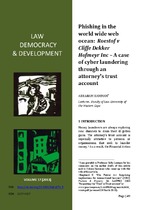| dc.contributor.advisor | Hamman, Abraham | |
| dc.date.accessioned | 2015-09-14T07:49:06Z | |
| dc.date.available | 2015-09-14T07:49:06Z | |
| dc.date.issued | 2013 | |
| dc.identifier.citation | Hamman, A. (2013). Phishing in the world wide web ocean: Roestof v Cliffe Dekker Hofmeyr Inc - A case of cyber laundering through an attorney's trust account. Law, Democracy & Development, 17: 49-63 | |
| dc.identifier.issn | 2077-4907 | |
| dc.identifier.uri | http://hdl.handle.net/10566/1600 | |
| dc.description.abstract | Money launderers are always exploring new channels to clean their ill-gotten gains. The attorney’s trust account is especially attractive to persons, or organisations, that seek to launder money. As a result, the Financial Action Task Force (FATF) has included lawyers amongst other professionals who are regarded as targets in complex money laundering schemes. In Roestof v Cliffe Dekker (Roestof) a trust account of an attorney was transformed into an instrument of crime and manipulated in pursuit of a criminal purpose. This crime was in the process hidden behind the veil of credibility which attaches to the trust account. Attorneys’ firms have vast amounts of money in their trust accounts. They must be heedful, on the one hand, of not becoming victims of money launderers as a result of phishing schemes and, on the other hand, they must be alert to the fact that their accounts may be used as one-stop laundromats to clean the money. In this article the behaviour of two attorneys will be discussed: the one attorney, Roestof, whose money was fraudulently transferred out of his Absa Bank private account, and Adriaans, the other, a director at the time of Cliffe Dekker, who caused the money to be transferred to the cyber launderer. The article then further examines the court’s failure to discuss the conduct of the attorneys in relation to suspicious and unusual transactions and includes recommendations as to how attorneys can put safeguards in place to avoid becoming victims. In Roestof, an amount of R350 000 was fraudulently transferred out of the plaintiff’s personal account, and R200 000 thereof was cleaned via the trust account of the defendant firm. One of the directors of the firm was led to believe that the firm was receiving payment of a debt due to one of its clients. It was the client who used the attorney firm’s trust account as a conduit to decontaminate the criminal proceeds of the phishing scam and caused the onward transmission of the money to another party. Attorneys need to be much more watchful to avoid becoming victims of phishing schemes and be much more alert to the fact that there are criminals who may masquerade as clients, who will utilise their accounts as devices to clean their ill-gotten gains. | |
| dc.language.iso | en | en_US |
| dc.publisher | University of the Western Cape, Faculty of Law | en_US |
| dc.rights | Article published under University of the Western Cape open access | |
| dc.source.uri | http://dx.doi.org/10.4314/ldd.v17i1.3 | |
| dc.subject | Phishing | en_US |
| dc.subject | Money laundering | en_US |
| dc.subject | Attorney trust account | en_US |
| dc.subject | Cyber laundering | en_US |
| dc.title | Phishing in the world wide web ocean: Roestof v Cliffe Dekker Hofmeyr Inc - A case of cyber laundering through an attorney's trust account | en_US |
| dc.type | Article | en_US |
| dc.privacy.showsubmitter | false | |
| dc.status.ispeerreviewed | true | |
| dc.description.accreditation | Department of HE and Training approved list | en_US |

